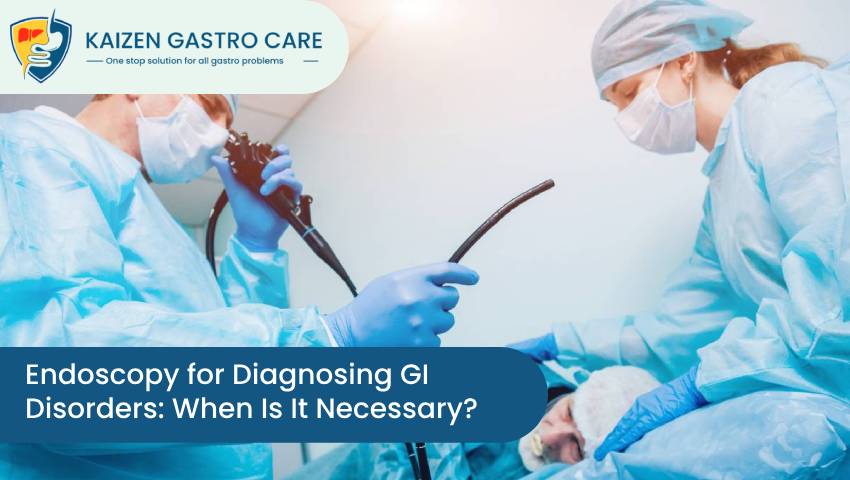
- 14/10/2024
- Kaizen Gastro Care
- 0 Comments
- GI Motility
Endoscopy for Diagnosing GI Disorders: When Is It Necessary?
Endoscopy is a powerful tool in modern gastroenterology that allows doctors to examine the digestive tract in detail. It’s a minimally invasive procedure used to diagnose, and sometimes treat, a range of gastrointestinal (GI) disorders.
At Kaizen Gastro Care, we specialize in performing endoscopic procedures with precision and care. The best endoscopy specialist in Pune is Dr. Vikrant Kale at Kaizen Gastro Care, specializing in endoscopic procedures to accurately diagnose and manage digestive diseases. Schedule an appointment today to get expert advice and solutions for your GI health.
But when is it essential to undergo an endoscopy, and what conditions does it help to diagnose? Let’s explore.
What is an Endoscopy?
Endoscopy involves using a thin, flexible tube with a light and camera at the tip, known as an endoscope, to examine the interior of your digestive tract. The procedure can be used to investigate signs, confirm a diagnosis, and sometimes treat GI conditions.
Common Types of Endoscopy:
- Upper Endoscopy (EGD): Used to examine the esophagus, stomach, and the beginning of the small intestine (duodenum).
- Colonoscopy: A technique that inspects the colon and rectum.
- ERCP (Endoscopic Retrograde Cholangiopancreatography): Combines endoscopy with X-ray to examine bile and pancreatic ducts.
- Capsule Endoscopy: Involves consuming a small, pill-sized camera that captures images of the entire digestive tract.
Common GI Disorders Diagnosed with Endoscopy:
Endoscopy is often used to diagnose various GI disorders, including:
- Gastroesophageal Reflux Disease (GERD): When acid from the stomach flows back into the esophagus, causing heartburn and irritation.
- Peptic Ulcers: Open sores in the lining of the stomach or the small intestine.
- Celiac Disease: An immune reaction to eating gluten that harms the small intestine.
- Gastritis: Inflammation of the stomach lining.
- Barrett’s Esophagus: A complication of GERD where the esophageal lining changes, potentially increasing the risk of cancer.
- Colon Polyps and Colorectal Cancer: Abnormal changes in the colon that can become cancerous.
When is Endoscopy Necessary?
Dr. Vikrant Kale usually recommends an endoscopy based on specific symptoms, risk factors, or diagnostic needs. Here are common reasons why you may need one:
- Unexplained Digestive Symptoms: If you experience chronic digestive issues like persistent heartburn, stomach pain, nausea, vomiting, or difficulty swallowing, a doctor may suggest an endoscopy to look for ulcers, inflammation, or other GI issues.
- Screening for Cancer: Routine endoscopies, specifically colonoscopies, are suggested for individuals over the age of 50 to screen for colorectal cancer. Those with a family history of GI cancers may require more frequent screenings.
- Chronic Diarrhea or Constipation: If you have long-term bowel issues that haven’t responded to treatment, an endoscopy can help detect disorders like inflammatory bowel disease (IBD), Crohn’s disease, or cancer.
- Bleeding in the Digestive Tract: Any symptom of blood in your vomit or stool is a red flag. Endoscopy helps find the source of bleeding, which may be due to ulcers, tumors, or other GI disorders.
- Follow-up of Known GI Conditions: Endoscopy can also be used to monitor the progression of certain conditions like GERD, Barrett’s esophagus, or Crohn’s disease, ensuring that treatment is working or that there are no complications.
Benefits of Endoscopy:
Endoscopy is a safe, effective way to diagnose and occasionally treat GI issues. It allows for biopsies, the removal of polyps, or stopping bleeding during the process, which can help prevent the need for surgery.
Conclusion:
Endoscopy is a vital diagnostic tool in gastroenterology, offering a clear view of the digestive tract and helping to diagnose a wide range of GI disorders. If you’re experiencing persistent signs or fall into a high-risk category for certain conditions, consult with Dr. Vikrant Kale at Kaizen Gastro Care to determine if an endoscopy is the right step for you.
Book your consultation today at Kaizen Gastro Care to discuss your GI health concerns and explore the role of endoscopy in diagnosing and treating digestive conditions.
